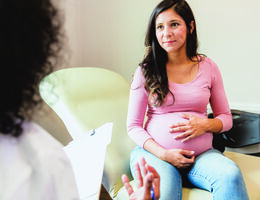
Regular prenatal care when you're expecting is always important. Certain serious problems can develop over the course of your pregnancy and it takes a healthcare provider to diagnose them. A condition known as pre-eclampsia is one of them.
What is pre-eclampsia?
Pre-eclampsia is a disorder that usually begins after 20 weeks of pregnancy. It's marked by high blood pressure and signs that the organs, often the kidneys and liver, are not working properly.
No one knows what causes it. But your provider can watch for its signs: high blood pressure and large amounts of protein in the urine.
Risks for moms and babies
If left untreated, pre-eclampsia can cause serious health problems for you and your baby.
For women, these complications can include kidney, liver and brain damage and problems with blood clotting. Rarely, it can also develop into eclampsia, a life-threatening condition that may cause seizures or even comas. Pre-eclampsia can also cause stroke.
Severe pre-eclampsia can lead to another problem. It's known as the HELLP syndrome. It affects liver and blood cells, impairs blood clotting and can cause liver damage.
Pre-eclampsia can also keep babies from getting needed nutrients and oxygen. Possible issues include:
- Low birth weight.
- Problems with your placenta.
- Premature birth.
- Stillbirth.
Fortunately, most pre-eclampsia issues can be prevented with regular prenatal care. And most women with the condition deliver healthy babies, says the American Academy of Family Physicians (AAFP).
Who's at risk?
It's not always easy to predict who will develop pre-eclampsia, but you are more likely to have it if:
- Your mom or sisters had it during their pregnancies.
- You are carrying more than one child.
- You are a first-time mom, or older than 35.
- You are obese.
- You had pre-eclampsia with a previous pregnancy.
- You have diabetes, kidney disease or lupus.
- You had high blood pressure before you became pregnant.
- You used IVF to get pregnant.
What are the signs?
If pre-eclampsia is mild, you may not have any signs. When symptoms do occur, they may include:
- Sudden swelling of feet and hands.
- Sudden weight gain (2 to 5 pounds in a week).
- Severe headaches.
- Blurred vision.
- Dizziness.
- Intense stomach pain.
These symptoms may or may not mean you have pre-eclampsia, but you should see your provider if any of them develop.
How is pre-eclampsia treated?
Your health should be closely monitored if you have signs of pre-eclampsia. Your doctor will want to see you more often to keep tabs on you and baby.
If you have pre-eclampsia, treatment depends on:
- How bad it is.
- How your baby is doing.
- How far along in your pregnancy you are.
If pre-eclampsia develops later on in pregnancy, delivering the baby might be best. But if it's too early for delivery, steps can be taken to manage the condition. For example, you may start taking medicine to lower your blood pressure.
It's possible to have short-term complications caused by pre-eclampsia after delivery. This can include increased blood pressure, but it usually goes away within a few weeks, the AAFP says.
More pregnancy news
Your provider will give you a variety of tests and exams all throughout your pregnancy. Learn more about which tests you may receive during your second trimester.
Additional sources: American College of Obstetricians and Gynecologists; March of Dimes; Eunice Kennedy Shriver National Institute of Child Health and Human Development
Reviewed 1/8/2025